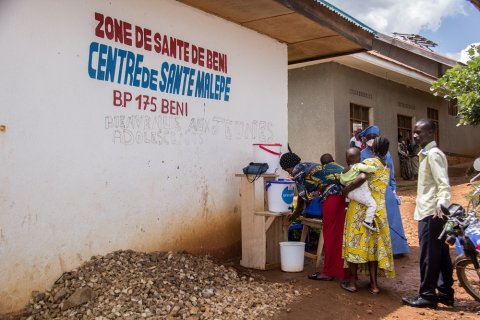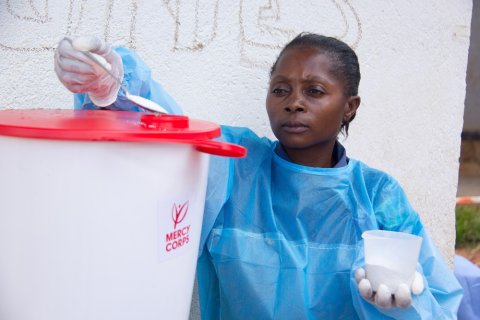RSTMH response to Ebola crisis in DRC

We are in the midst of the second largest Ebola outbreak in history – second only to the 2014 West African epidemic.
According to the WHO, as of 21 May, there have been 1,866 confirmed and probable cases of Ebola reported, of whom 1,241 have died. The true figure may be much higher.
In the last few weeks, media coverage has started to bring to light the scale and many complexities of the crisis.
Devastating consequences and a challenging context
Ebola is a disease with devastating consequences: an extremely high case fatality rate and lasting stigma for those who survive, all of which disrupts communities and cultural practices.
However, the context of this specific outbreak is particularly challenging, as the communities are also dealing with conflict and political instability, which has caused misinformation, mistrust and understandable fear.
While there have been medical advances in the form of effective vaccines and also lessons learnt since the last outbreak, this crisis has moved from a purely medical emergency to a more social and holistic one. This is why the response needs to be driven by the national government and the affected communities themselves.
Decades of experience working in outbreaks
As a Society that has worked in this field for decades, we want to express our sadness at the outbreak, for the lives that have been lost, and to offer our support for the families and communities still fighting the disease, and for health workers delivering education and treatment. We support the WHO, key institutions and NGO partners who are working to save lives and prevent the situation worsening.
Our Fellows and members are based across the world; many are working or have worked on Ebola, many are based in, or have worked in the DRC and neighbouring areas. Many have experience of outbreak situations, across many diseases and decades. Given the crisis and their collective knowledge, we asked our Fellows and members what they felt we could do to help.
Almost all of those who replied feel we should be doing something and most felt that it should be a combination of short and long-term support. There were many ideas: one of our members – a doctor working in DRC – urged us to help him and his peer network disseminate accurate and timely information about Ebola to try and counter some of the rumours about the disease on social media, which is, in part, preventing the community from seeking help when they are unwell. They would also like to start developing some new education tools and ideas to help the community.
They urged us to help keep the story alive in the media, to help raise awareness and potentially funds.
Lack of data and research
They felt better data are needed to help us be more prepared, as a global community, for where this outbreak may lead. They outlined the challenges of the health seeking behaviours in a community that is quite widely spread, with strong reliance on traditional healers in patient journeys and in a region with very limited health infrastructure.
There was also a sense that research is lacking in some important areas, mostly on the social science side of the crisis, which we should be pushing for through our journals and small grants.
Many Fellows and members felt we should be optimising the knowledge contained in the journals and should harness the experience in our network to help provide training for those working in this and future outbreaks.
Members and Fellows not working on this crisis want us actively to find ways to better support our members who are directly involved.
Partners working on the ground
We have also been speaking to our partner organisations, across all sectors, who are working on the ground, to understand their views on how we could help. Most felt well-prepared on the technical side: with vaccines, lab support and care plans.
Nevertheless, further dialogue on the value of deploying other candidate vaccines to complement the diminishing supply of the Merck vaccine could be useful. On the non-medical side, improvements are clearly needed: psychosocial support for patients, families and health workers is improving, but support to bring together and engage communities who are scared and not sure what information to trust needs more work.

Some talked about the difficulty in scaling up useful programmes due to funding difficulties. There are also challenges of tracing patient networks, which hinder the control process: this could be better supported with real-time viral sequence analysis to understand the trajectory of the epidemic. On community mobilisation and engagement, they asked how we could help stimulate research in these areas, so we can further develop more appropriate models.
Aligned with this, they were keen to see more research in the non-medical elements such as WASH, and reporting and monitoring on all non-medical aspects of the programme. There was consensus around the need for us all to support community ownership and solutions.
Our partners also expressed the desire to share their direct experience, through our scientific channels. They urged us to ensure that progress and learnings lead to action for future outbreaks.
Rapid diagnostic tests
An area we also learned about and are interested in exploring is around rapid diagnostic tests, particularly where communities may be fearful or unable to visit treatment centres due to illness, fear and lack of infrastructure. In more remote areas, lab-based testing may mean delays with negative effects on disease progression. False negative and false positive results can be devastating for patients and their families.
In this scenario a rapid diagnostic test to identify Ebola that could even be carried out at home, by a community health worker, could be useful on many levels.
We turn now to consider how we could help. We can support our members working in the crisis by helping them establish useful contacts. We can listen to them and capture their experience, learning and advice and feed this in to long-term learning so that future lives are saved.
We can raise awareness of the changing situation to our members not involved, but who want to know more and help more indirectly. We can help in the global efforts to keep the crisis in the minds of the media and the public, and encourage support.
What RSTMH aims to do
More specific activities that we are scoping include:
- Using the knowledge of our Fellows and members who have worked in past outbreaks to help design training for those working in this and future outbreaks
- Ensuring our journal articles on Ebola are freely available
- Considering sharing “voices from the field” from our partners through our available channels
- Calling for research on community mobilisation and engagement
- Reviewing our recent small grants submissions to see if any may be relevant to the situation
- Considering commissioning research into control processes and practices in outbreaks that occur in a conflict zone
- Potentially providing a platform at the 11th European Congress on Tropical Medicine and International Health in September 2019 to gather observations and learnings from those working in the area, providing the global audience with an opportunity to better understand the crisis
- Convening discussions with key stakeholders to help identify learnings, and input to future strategies
Over the next few weeks we will continue to speak with our Fellows, members and partners to see how we can help in this devastating crisis.
If you have advice or ideas, we would be glad to hear from you: please email tamar [dot] ghosh [at] rstmh [dot] org
Sarah Rowland-Jones, President
Tamar Ghosh, CEO